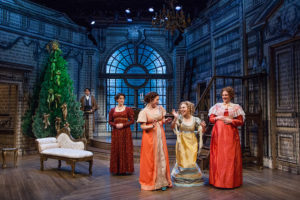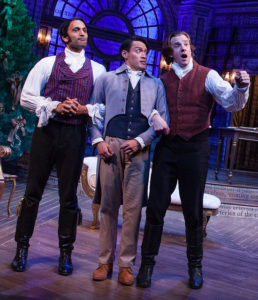
Review by James Wilkinson
‘Miss Bennet: Christmas at Pemberley’ Written by Lauren Gunderson and Margot Melcon. Directed by Bridget Kathleen O’Leary. Scenic Design: James J. Fenton. Costume Design: Linda Ross. Lighting Design: Brian J. Lilienthal. Sound Design: David Remedios. Wig Design: Rachel Padula-Shufelt. Produced by Merrimack Repertory Theatre, 50 E Merrimack St, Lowell through December 23rd.
In the interest of full disclosure, I’m going to admit that I walked into Merrimack Repertory Theatre’s production of Miss Bennet: Christmas at Pemberley with a certain amount of trepidation. The play by Lauren Gunderson and Margot Melcon is a (sort of) sequel to Jane Austen’s Pride and Prejudice, taking place around Christmas sometime after the events of the original novel. I don’t have any particular antipathy to Christmas shows, (I’ve seen versions of A Christmas Carol that have left me weeping in my seat). Nor do I have any ill will toward Jane Austen. Actually, my trepidation comes from opposite feelings. I have an unabashed and enthusiastic love of Austen’s work. I have ever since first encountering Pride and Prejudice in high school and since then have read and reread all of her novels. I’ve seen most of the film and television adaptations of her work and I’m in a long running argument with a close friend about the merits of the 2005 Keira Knightley movie of Pride and Prejudice (she’s con, I’m pro and I’m not giving up that fight anytime soon…). So when I come to Miss Bennet, I come from a place of love. What’s going to happen to these characters that I’ve lived with for so long?
If you haven’t read Pride and Prejudice, (and I highly recommend you do. It holds up), you won’t have any difficulty understand what’s happening in Miss Bennet. There are a few lines that have added weight if you know the characters’ histories (like when Mr. Darcy casually mentions that his courtship with his wife wasn’t particularly smooth), but for the most part, audiences can come into the play cold. The Miss Bennet of the title doesn’t refer to Elizabeth Bennet, Pride and Prejudice’s heroine, but to Mary, the middle of the five Bennet sisters. In the original novel, Mary mostly remains on the sidelines of the plot, only occasionally speaking up to provide commentary on her sisters’ actions. Here, Mary opens the show with a letter to her sister letting us know where we are. It’s been two years since the events of Pride and Prejudice. Elizabeth is now Mrs. Darcy; older sister Jane is pregnant with her and Bingley’s first child and the entire Bennet clan is due to descend on Pemberley (Mr. Darcy’s estate) for the holiday season. Unlike most of her sisters, Mary is still single and living with their parents. She’s enjoyed having a quiet life of contemplation with her personal library, but now she’s beginning to wonder, is that enough? Enter Arthur de Bourgh, Darcy’s cousin who joins the party for the holiday season. He too is a bookish, quiet and somewhat awkward individual. He and Mary catch each other’s eye almost immediately upon his arrival. If you don’t know where this is going, you’re clearly not paying attention. The play telegraphs exactly how this is going to end from the start and while I secretly hoped for a last minute plot twist to prove me wrong, it never came.

I’d like to think that I can appreciate what Gunderson and Malcon are doing here. They’re trying to create a great big crowd-pleaser of a show and it’s this element that Merrimack Rep’s production digs into. James J. Fenton’s absolutely gorgeous scenic design greets the audience like a paper dollhouse blown up to more than life-size. Linda Ross’ costumes provide the splash of color that keeps the stage images bright and cheerful. Vichet Chum, who was fantastic in MRT’s production of Knyum last season is great here and has a formidable scene partner in Amanda Collin’s Mary Bennet. In fact, all of the actors exude an engaging and likeable presence. Even when certain characters perform less than honorable actions, it’s all done with a heightened comic sensibility so that you can’t really get mad at anyone. Everything about the production seems to be screaming “YOU WILL ENJOY THIS!”

There are moments when I succumbed. One gag involving a long drawn out pause while a character stalls for time had me snorting laughter into my palm as did a handful of other jokes and one-liners throughout the evening. If the rule of thumb is that a production has to make you laugh at least six times to be considered a proper comedy, this certainly passed that mark. But at the same time, there’s something about the production that feels just a little too well-behaved and calibrated for me to properly get lost in the work. Take one of the scene transitions mimed out early in the show. Elizabeth and Jane come on stage, each with a box of ribbons, presumably to decorate the room. Instead, they hide on either side of a doorway until one of their husbands walks through, at which point they playfully throw the ribbons into his face and everyone laughs. He laughs. They laugh. We’re all supposed to laugh, but it’s hard to when the moment feels so manufactured to show how much fun we’re all supposed to be having.
I’ve been trying to mentally separate my knowledge of Austen’s work with MRT’s production, so that I can approach the play on its own terms, but it’s proving difficult as the two seem bound together in a giant sticky knot. The production seems to be doing what it can to remind you of the play’s literary heritage. The set is literally made of enlarged pages of text from a novel. Late in the show, Pride and Prejudice’s famous opening line is referenced for a joke, (one that had me cringing in my seat). So it openly invites the comparison.
I always get irritated when I hear Austen get dismissed as an author of light romances. Film adaptations tend to foreground the romantic storylines, but taking that view glosses over so much of what makes her work so brilliant. Her novels are stuffed with insights about human nature and all manner of relationships. But it doesn’t feel as though Miss Bennet is as interested in investigating its characters in the same way. Instead it chooses to focus on the budding relationship between Mary and Arthur. This isn’t necessarily a bad thing (after all, the play needs to form its own identity) but it can leave you with the sense that the play isn’t going as deep as it could. For Austen’s characters the sword of Damocles was constantly hanging over their heads if they didn’t marry. The law didn’t allow Bennet sisters to inherit their father’s estate; if they didn’t make a good match, they’d be left destitute. But the Mary of Miss Bennet doesn’t act concerned about this. It doesn’t factor into her romance with Arthur. Interestingly, another character later on does bring up the perils of spinsterhood and her fear of being forced out of her house. But right after this reveal the moment is undercut with a joke and the threat doesn’t register for the audience.
It would be a fool’s errand to try and guess what the dead would think of present day events, so I’m not going to try, (who knows? Maybe Austen would be tickled by this continuation of her original tale). And some ways you have to consider Miss Bennet a success because it’s delivering exactly what it promises on the box. By the end of show you’re surrounded by an aura of family, merriment and singing. But it left me wanting more. More of Austen’s vicious humor and hard truths. A tougher edge hidden under the Christmas pudding. This is a little too much sugar. For tickets and more information, visit their website: www.mrt.org

